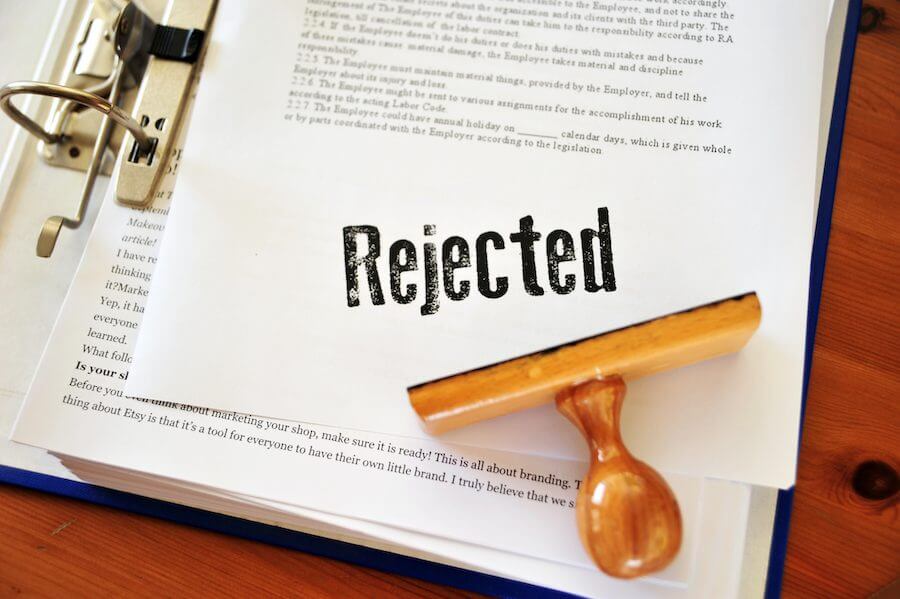Every time employers advertise for a job opening, they receive lots of applications. After shortlisting successful applicants for the interview, professionalism dictates that the employer should inform unsuccessful applicants via letter or email.
This rejection letter is also known as the no-interview letter. Though the work of informing unsuccessful applicants is tedious, it’s vital for the employer’s branding and maintaining relationships with potential future employees. The rejection letter before the interview should be brief, kind, and professional.
Free Templates
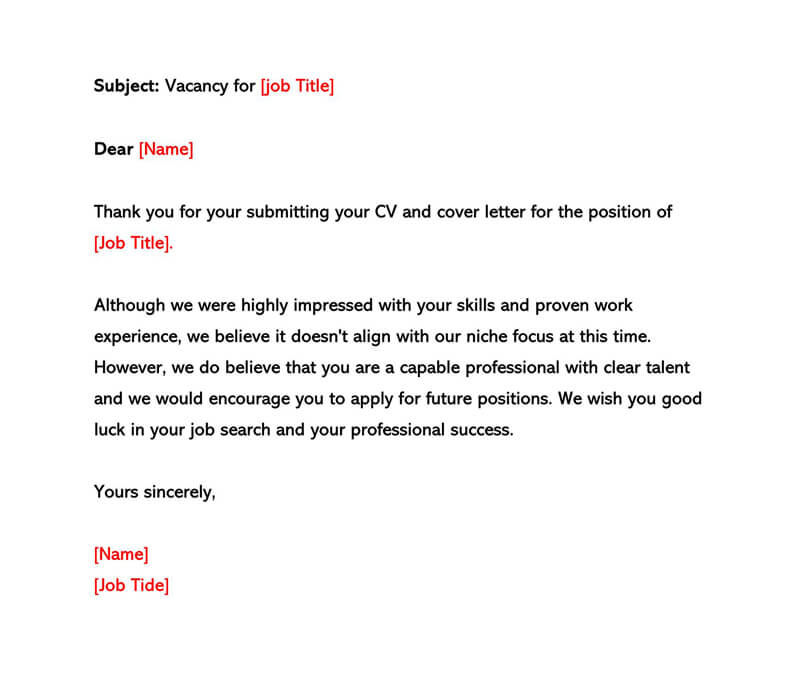
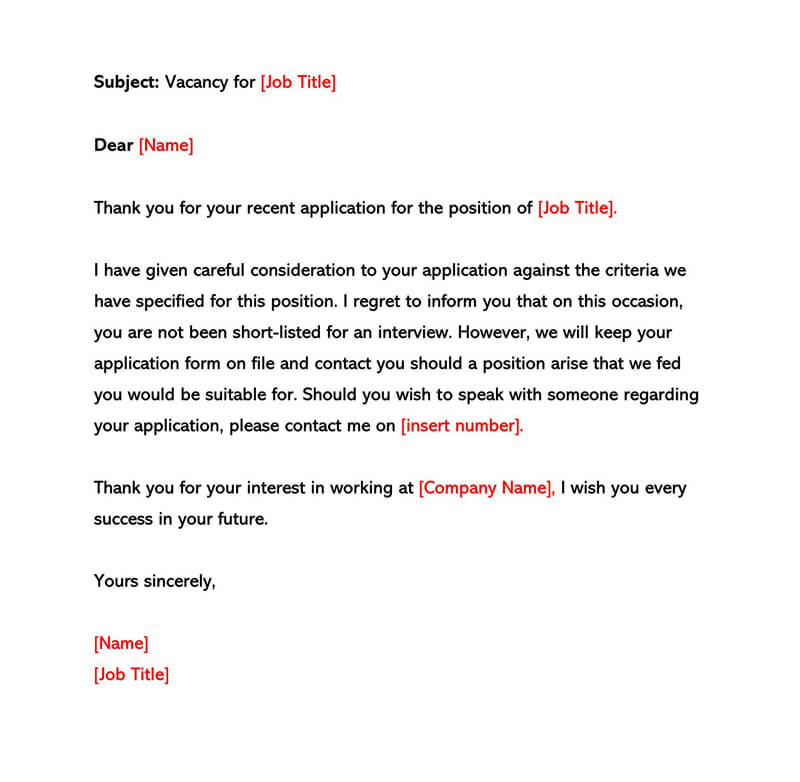
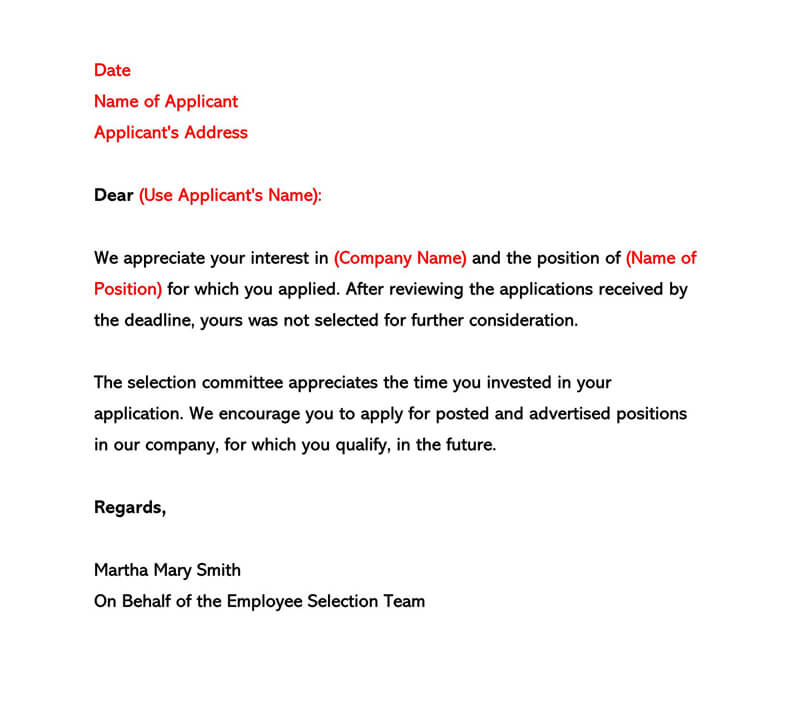
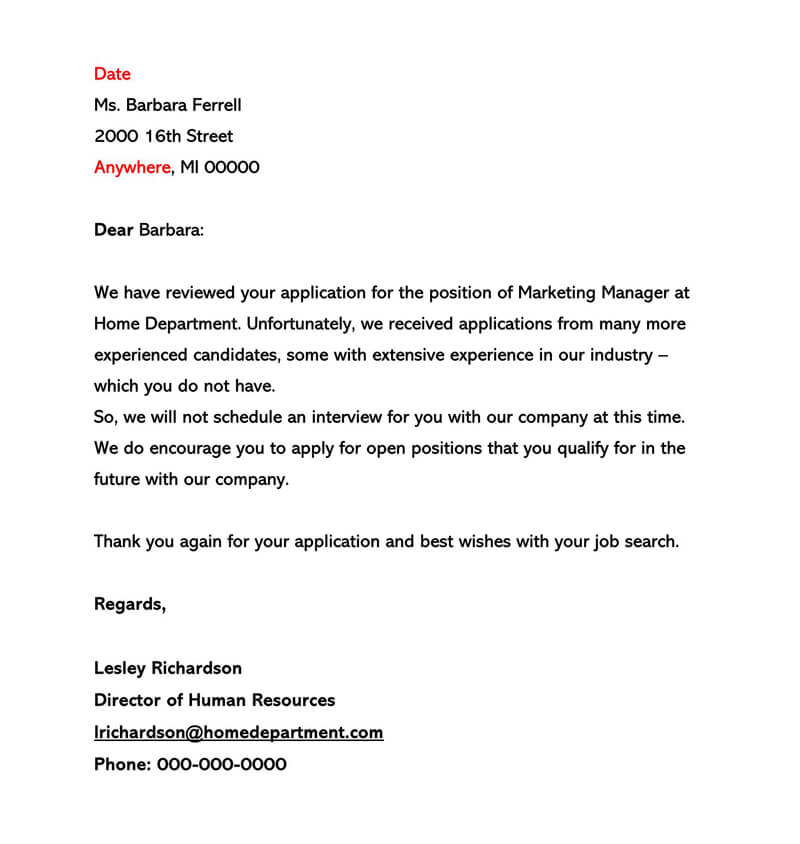
Rejection Letter Format
A standard no-interview letter should follow the following structure:
- Employer Address: The letter should start with the employer’s/sender’s address. It should appear on the top right-hand side of the page.
- Date: After the letterhead, skip a line and include the current date.
- Candidate address: After the date comes to the recipient’s or applicant’s address, leave a space between the date and the recipient’s address.
Rejection Email Format
If you’re writing an email, you should skip these first three steps.
- Subject: The subject of the letter should be brief and precise. It should include the job title. The recipient should understand the purpose of the email by reading the subject.
- Salutation: Use the appropriate title for the applicant. In most cases, use the word “dear,” followed by the applicant’s name.
- Body: The body of the letter should comprise at least three paragraphs. In the first paragraph, thank the applicant for taking the time to apply for the job. In the subsequent paragraphs, explain in brief why the candidate was unsuccessful.In the closing paragraph, you should commend the applicant and express the hope that they may succeed in future job openings at the company.
- Complimentary close: Use suitable polite words to close the letter, such as “sincerely,” “yours sincerely”, etc followed by your name, signature, and designation.
Template Rejection Letter
[Your Company Name]
[Your Company Address]
[City, State, Zip Code]
[Date]
[Applicant’s Name]
[Applicant’s Address]
[City, State, Zip Code]
Dear [Applicant’s Name],
Thank you for your interest in the [Position Name] position at [Your Company Name] and for taking the time to share your background and experiences with us. We have carefully reviewed your application among a highly competitive pool of candidates.
After thorough consideration, we regret to inform you that we will not be moving forward with your application for this position. This decision does not reflect on your qualifications or potential but rather the alignment of our current needs and the specific skills and experiences of other candidates.
We appreciate the opportunity to learn about your achievements and professional aspirations. We encourage you to apply for future openings at [Your Company Name] that match your skills and experience.
Thank you again for considering a career with [Your Company Name]. We wish you all the best in your job search and future professional endeavors.
Warm regards,
[Your Name]
[Your Position]
[Your Company Name]
[Your Contact Information]
Sample Rejection Letter Before an Interview
Dear Jordan,
Thank you for your application and interest in the Risk Analyst position with Quantum Financial Services. We appreciate the time and effort you invested in your application to join our team.
After a thorough review of your application materials, we regret to inform you that we will not be moving forward with your candidacy for this position. We received applications from many highly qualified candidates, and the selection process was highly competitive. Our decision was based on matching the specific qualifications and experiences we are seeking for this role with the profiles of the applicants.
We would like to express our sincere appreciation for considering Quantum Financial Services as a potential employer and for sharing your professional background with us. Your experience in risk analysis and financial services is impressive, and we have no doubt that you will find a position that fits your skills and career aspirations.
Please consider applying for future opportunities with us that match your qualifications and interests. We wish you the best in your job search and your future professional endeavors.
Thank you again for your interest in Quantum Financial Services. Should you have any questions or wish for feedback on your application, please do not hesitate to contact our HR department at hr@quantumfs.com.
Warm regards,
Alice Smith
HR Manager
Quantum Financial Services
alice.smith@quantumfs.com
Key Takeaways
This rejection letter demonstrates effective communication practices for delivering unfavorable news, marked by several key elements:
Appreciation for Effort: It opens by thanking the candidate for their application and the effort put into the process, setting a respectful tone.
Clear Communication of Decision: The letter straightforwardly informs the applicant that they will not be moving forward in the selection process, ensuring clarity.
Reason for Rejection: It provides a brief explanation for the decision, noting the competitive nature of the selection process and the alignment of qualifications with the role, which helps the candidate understand the context.
Acknowledgment of Qualifications: By complimenting the applicant’s background, the letter softens the impact of the rejection and encourages the candidate by recognizing their professional value.
Encouragement for Future Applications: The invitation to apply for future positions suggests that the rejection is not a reflection of the candidate’s overall potential, fostering a positive relationship.
Offer of Further Engagement: The provision of contact information and the offer to provide feedback if desired show openness to further communication, offering a sense of support.
Professional and Warm Tone: Throughout, the letter maintains a professional yet warm tone, balancing the delivery of disappointing news with encouragement and respect.
This approach not only conveys the necessary information but also manages to maintain a positive relationship with the candidate, reflecting well on the company’s employer brand.
Tips for Writing an Interview Rejection Letter
As you write the letter, consider the following tips:
Avoid offering false hope
In your letter, be clear on why the applicant didn’t succeed in shortlisting. It’s unprofessional to encourage the applicant to apply for future jobs, yet they lack the necessary skills and knowledge the company requires.
Send the feedback immediately
Once you’re through with the shortlisting process, inform the unsuccessful candidates immediately so that they can proceed in applying for other jobs
Be positive
Though you’re writing a rejection letter, you should offer some hope to the candidate by highlighting any impressive skills and experience they might have. If you feel they may be eligible for future openings in your company, let them know.

